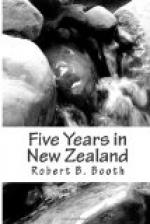Just at this time there arrived at Mesopotamia a friend of Butler’s by name Brabazon, an Irishman of good family, it being his intention to remain for some time as a cadet to learn sheep farming. He became a great personal friend of Cook’s and mine, and many a pleasant day we spent together when, during intervals of rest, I was able to pay a visit to the Rangitata Station.
On the completion of the road contract, the mustering season had begun, and I went over with my men to give a hand and remained for a month assisting at the shearing, etc.
I think it was at this time that a most sad occurrence took place, resulting in the death of Dr. Sinclair, who was travelling for pleasure in company with Dr. Haast, Geologist and Botanist to the Government of Canterbury. He and Dr. Haast with their party had been staying at Mesopotamia for a few days previous to starting on an expedition to the upper gorge of the Rangitata. They all left one afternoon, Dr. Sinclair, as usual, on foot. He had an unaccountable aversion to mounting a horse, and could not be induced to do so when it was possible to avoid it. Strange to say, a horse was eventually the cause of his death. He was a man of some seventy years of age with snow white hair, a learned antiquary and botanist, and old as he was, and in appearance not of strong build, he could undergo great fatigue and walk huge distances in pursuit of his favourite science.
The party had proceeded in company some few miles up the river, when Haast and his men went ahead to select a camping place, leaving Dr. Sinclair with a man and horse in attendance to come on quietly and take him over the streams, the intended camp being on the opposite side of the river.
[Illustration: UPPER GORGE OF THE RANGITATA.]
The plan adopted for crossing a stream, when there is more than one person and only a single horse, is as follows: One end of a sufficiently long rope is fastened round the animal’s neck, the other being held by one of the men. One then crosses the stream on horseback, when he dismounts, and the horse is hauled back by means of the rope, when another mounts, and so on. In this instance the attendant rode over first, but the stream being somewhat broader than the rope was long, the latter was pulled out of Dr. Sinclair’s hands. The man then tried to turn the horse back loose, but the animal, finding himself free, bolted for the run. Dr. Sinclair called to the man that he would ford the stream on foot, and although, as the attendant stated, he warned him against attempting to do so, he immediately entered, but the current was too powerful and quickly washed him off his feet. It was now nearly dark and the man said that although he ran as fast as he was able down the stream, he was unable to see anything of the Doctor. This was the miserable story the station hand gave in at the homestead when he arrived an hour afterwards.




